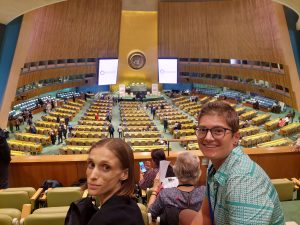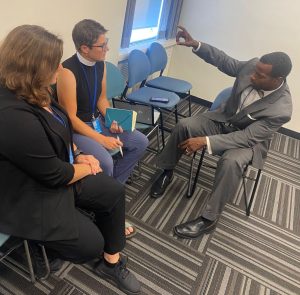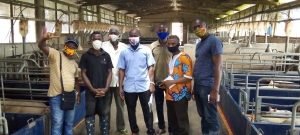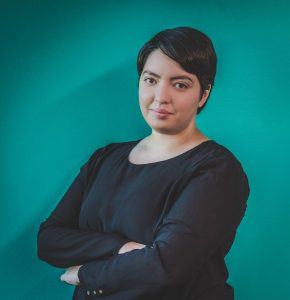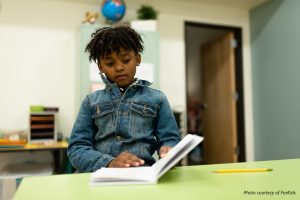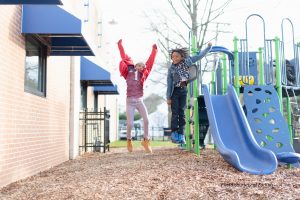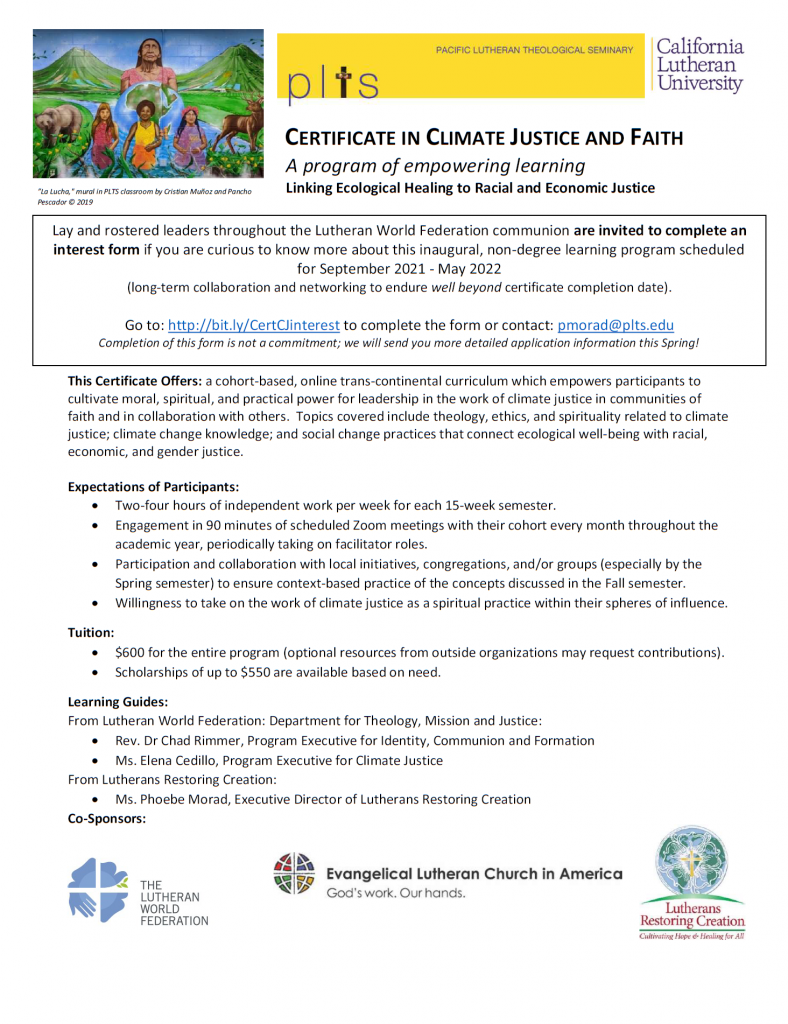The following is taken from the 2024 ELCA World Hunger Lent Study. The full resource can be ordered as a hardcopy or downloaded as a PDF in English or Spanish at the link here.
Reconciliation
•••
Genesis 9:8-17
Psalm 25:1-10
1 Peter 3:18-22
Mark 1:9-15
During Advent we reflected together on what it means to encounter God. We contemplated the spaces where God is revealed to us, the invitation to be part of God’s work in history, the vocation to which the church is called today and what it means to be grasped by the proclamation of Christ’s birth. Now, during Lent, we return to this journey, exploring the many ways we encounter God as we respond to hunger, poverty and need today. In this first session we will explore the act of reconciliation, the restoration of wholeness to relationships and to people when injustice makes the fullness of life in community impossible.
Jerri Eliano de Quevedo and his wife, Sirlei Eloí, live in the Kilombo Monjolo, a community in the municipality of São Lourenço do Sul in Brazil. Like many kilombola — descendants of the 4.5 million enslaved Africans brought to Brazil between 1570 and 1857 — they support themselves and their children principally through farming a plot of land in the kilombo. The plot is small, about 2 hectares. Given the frequent droughts, inadequate infrastructure and insufficient legal or political protections, making a living in this community can be incredibly difficult. In the past Jerri and Sirlei have tried to find work in urban centers outside the kilombo, but they have no access to education, so few jobs are available to them.
For Jerri, finding a way to stay on the land while feeding his family is not just a matter of finances but also of kilombola cultural identity. “The kilombolas always had to grow their food in small spaces, all together, because they didn’t have much land,” he explains. “This, for us, is cultural, and working in another way is out of our custom.”
A cultural relationship with and ecological knowledge of the land are central to kilombola history. From Africa the kilombola brought seeds and extensive knowledge of crops, which helped some of them to develop sophisticated agroforestry and farming systems. Yet access to sufficient land has always been a challenge for kilombolas, whose communities sprang from their resistance to slavery. As Edward Shore describes in the Texas Law Review, “Wherever there was slavery, there was also resistance — which assumed many forms. One such form of resistance was the formation of communities by [people who had escaped enslavement], known in Brazil as mocambos and kilombolas, demonyms of Kimbundu (Angolan) origin that signified ‘hideouts’ and ‘encampments.’”¹ Kilombolas in Brazil are similar to maroon communities in the United States, where self-liberated enslaved people formed isolated or hidden settlements.
These communities quickly became an important and visible part of Brazilian life but remained frequent targets of vilification and violence, both during and after slavery. Kilombolas were often forcibly removed from their land, and laws were passed in the 19th century that prevented them from owning land without official government titles, something most kilombolas were unable to obtain. In the century after Brazilian slavery ended in 1888, kilombolas faced significant obstacles to legal protection, education and economic opportunities.
In 1988 a new constitution in Brazil promised to protect AfroBrazilians’ rights, especially the right to land. Shore writes, “Brazil, the last country in the Americas to abolish slavery (in 1888) became the first country to constitutionally guarantee the collective land rights of the descendants of enslaved people.”² Though there is work to be done to fully guarantee kilombola rights, kilomobolas across Brazil have joined together to grow local economies and defend their constitutional right to land. The oppression of kilombolas testifies to the need for full reconciliation, to bring full opportunity for dignity and life to a people the world actively marginalizes.
The Igreja Evangélica de Confissão Luterana no Brasil (IECLB) and its diaconal arm, the Fundação Luterana de Diaconia (FLD), have journeyed with Jerri, Sirlei and the Kilombo Monjolo in this work, in partnership with the Center for Support and Promotion of Agroecology (CAPA) in the southern region of the Rio Grande do Sul state. This work is supported in part by ELCA World Hunger. Through the project, kilombola farmers joined together in cooperatives to gain access to seeds, training and new opportunities. “The community started to change,” Jerri says. Over time, other entities, including universities, began working with the community. “We began to have support, and life got better.”
“The work of CAPA within the community is about accompaniment, partnership and joint construction, and with open dialogue, creating the farming projects and other activities,” Jerri says. The kilombola communities, which practice their own ancestral spirituality, have worked with CAPA/Lutheran Foundation of Diakonia for decades. In addition to the farming projects, the partnership has helped as the kilombola market handicrafts, share technical advice, and acquire legal documentation, housing and access to spaces for public policy advocacy.
The most important work, though, according to Jerri, has been winning recognition of the community as a kilombola. “In my
understanding,” he says, “the work of CAPA so that we were recognized as a kilombola community was fundamental, so that today we could be in spaces of discussion, commercialization and seeking our rights.”
The project has helped Jerri and Sirlei diversify their crops, access markets and increase their income. Through it all they
have been recognized for their identity, dignity and rich history. “When we came to Brazil, it was not to be merchants but to be
traded,” says Jerri. “So this has brought us a big change, bringing respect and visibility.”
Jerri and Sirlei’s story shows how historic and ongoing injustices leave families vulnerable to hunger. Hunger is not incidental or accidental. In the case of Brazilian kilombolas it is the direct result of oppression and injustice — slavery, racism, discrimination, inequity, violence. Yet their story also reveals their witness of courage, strength and resilience as we work together toward a just world where all are fed.
In the Bible readings for this first week of Lent, the author of 1 Peter reminds us of Jesus’ death and resurrection, the cost of the sacrifice and the consequences. Jesus, who was executed by an unjust occupying political power in Jerusalem, gives his life and, in doing so, makes possible our reconciliation with God. Whereas sin estranges us from God and one another, Jesus restores us to fellowship with God, so that we may be restored in fellowship to one another.
This reconciliation is more than just a good feeling, more even than the experience of forgiveness. It is a radical restoration of relationship with the One who knows us. Reconciliation has its roots in a Latin term meaning “to overcome feelings of distrust or hostility” or, in another form, “to bring together, unite in feelings, make friendly.” To be reconciled is to overcome conflict and transform a broken relationship — to be restored, often in a new way. For the writer of 1 Peter, this is the work of Christ. As the author writes of baptism, this is not merely the removal of offending “dirt from the body” but a more profound transformation of relationship.
As we are reconciled to God, God calls us to reconcile with one another. Lent invites us to think more deeply about what that means. Grace assures us that we need not worry about our relationship with God; Christ has reconciled us. But grace also impels us into the world, to be witnesses of reconciliation in every relationship. This is not easy work. It will take confronting the brokenness in relationships marred by racism, oppression, exclusion and injustice. Nor is it quick work. To be reconciled isn’t merely to apologize and be forgiven for past wrongs but to do the work of building together a new, shared world where each of us will be recognized and respected for the fullness of dignity we have from God, who created us.
Reflection Questions
What does it mean to be reconciled? Where have you experienced reconciliation through your own faith?
How can hunger ministry be seen as an expression of our reconciliation to God, the world and each other?
How does the story of kilombolas in Brazil demonstrate that reconciliation must mean more than apology and
forgiveness?
What relationships in society, the church and the world need to be transformed to end hunger?
Reconciliation
•••
Génesis 9:8-17
Salmo 25:1-10
1 Pedro 3:18-22
Marcos 1:9-15
Durante el Adviento reflexionamos juntos sobre lo que significa encontrarse con Dios. Contemplamos los espacios donde Dios se nos revela, la invitación a ser parte de la obra de Dios en la historia, la vocación a la que la iglesia está llamada hoy, y lo que significa ser aprehendidos por el anuncio del nacimiento de Cristo. Ahora, durante la Cuaresma, volvemos a esta jornada, y exploramos las muchas formas en que nos encontramos con Dios mientras damos respuesta al hambre, la pobreza y la necesidad de hoy. En esta primera sesión exploraremos el acto de reconciliación, la restauración de la integridad de las relaciones y de las personas cuando la injusticia hace imposible la plenitud de vida en la comunidad.
Jerri Eliano de Quevedo y su esposa, Sirlei Eloí, viven en el quilombo Monjolo, una comunidad del municipio de São Lourenço do Sul, en Brasil. Como muchos quilombolas —descendientes de los 4.5 millones de africanos esclavizados traídos a Brasil
entre 1570 y 1857— se mantienen a sí mismos y a sus hijos principalmente a través del cultivo de una parcela de tierra en el quilombo. La parcela es pequeña, de unas 2 hectáreas. Dadas las frecuentes sequías, una infraestructura inadecuada e insuficientes protecciones legales o políticas, puede ser sumamente difícil ganarse la vida en esta comunidad. En el pasado, Jerri y Sirlei han tratado de encontrar trabajo en centros urbanos fuera del quilombo, pero como no tienen acceso a educación, hay pocos puestos de trabajo disponibles para ellos.
Para Jerri, encontrar una manera de permanecer en la tierra mientras alimenta a su familia no es solo una cuestión de finanzas, sino también de identidad cultural quilombola. “Los quilombolas siempre tuvieron que cultivar sus alimentos en espacios pequeños, todos juntos, porque no tenían mucha tierra”, explica Jerri. “Esto es algo cultural para nosotros, y no es parte de nuestra costumbre trabajar de otra manera”.
La relación cultural con la tierra y el conocimiento ecológico de esta son elementos fundamentales en la historia de los quilombolas, quienes trajeron de África sus semillas y un amplio conocimiento de las siembras, lo que ayudó a algunos de ellos a desarrollar sofisticados sistemas agroforestales y agrícolas. Sin embargo, el acceso a tierras suficientes siempre ha sido un reto para los quilombolas, cuyas comunidades surgieron de su resistencia a la esclavitud. Como describe Edward Shore en Texas Law Review: “Dondequiera que había esclavitud, también había resistencia, la cual asumía muchas formas. Una de esas formas de resistencia fue la formación de comunidades por personas que habían escapado de la esclavitud, conocidas en Brasil como mocambos y quilombolas, demónimos de origen kimbundu (angoleño) que significaban ‘escondites’ y ‘campamentos’”¹ Los quilombolas de Brasil son similares a las comunidades cimarronas de los Estados Unidos, donde las personas esclavizadas auto liberadas formaron asentamientos aislados u ocultos
Estas comunidades se convirtieron rápidamente en una parte importante y visible de la vida brasileña, pero siguieron siendo blanco frecuente de vilipendio y violencia, durante y después de la esclavitud. Los quilombolas eran a menudo sacados de sus tierras por la fuerza, y en el siglo XIX se aprobaron leyes que les impedían poseer tierras sin títulos oficiales del gobierno, algo que la mayoría de los quilombolas no podían obtener. En el siglo posterior al fin de la esclavitud brasileña en 1888, los quilombolas se enfrentaron a importantes obstáculos para recibir protección legal, educación y oportunidades económicas.
En 1988, una nueva constitución en Brasil prometió proteger los derechos de los afrobrasileños, especialmente el derecho a la tierra. Shore escribe: “Brasil, el último país de América en abolir la esclavitud (en 1888), se convirtió en el primer país en garantizar constitucionalmente los derechos colectivos sobre la tierra de los descendientes de personas esclavizadas”.² Aunque queda trabajo por hacer para garantizar plenamente los derechos de los quilombolas, los quilombolas de todo Brasil se han unido para hacer crecer las economías locales y defender su derecho constitucional a la tierra. La opresión de los quilombolas atestigua la necesidad de una reconciliación plena, para brindar plenas oportunidades de dignidad y vida a un pueblo que el mundo margina activamente.
La Igreja Evangélica de Confissão Luterana no Brasil (IECLB) y su rama diaconal, la Fundação Luterana de Diaconia (FLD), han caminado con Jerri, Sirlei y el quilombo Monjolo en este trabajo, en colaboración con el Centro de Apoyo y Promoción de la Agroecología (CAPA) de la región sur del estado de Rio Grande do Sul. Este trabajo es respaldado en parte por ELCA World Hunger. A través del proyecto, los agricultores quilombolas se unieron en cooperativas para obtener acceso a semillas, capacitación y nuevas oportunidades. “La comunidad comenzó a cambiar”, dice Jerri. Con el tiempo, otras entidades, incluidas las universidades, comenzaron a trabajar con la comunidad. “Empezamos recibir apoyo, y la vida mejoró”.
“El trabajo de CAPA dentro de la comunidad tiene que ver con el acompañamiento, alianza y obra conjunta y, con diálogo abierto, crear los proyectos agrícolas y otras actividades”, dice Jerri. Las comunidades quilombolas, que practican su propia espiritualidad ancestral, han trabajado con CAPA/Fundación Luterana de Diakonia durante décadas. Además de los proyectos agrícolas, la alianza ha ayudado a que los quilombolas comercialicen artesanías, compartan asesoría técnica y adquieran documentación legal, vivienda y acceso a espacios para la incidencia de políticas públicas. Sin embargo, el trabajo más importante, según Jerri, ha sido ganar el reconocimiento de la comunidad como quilombola. “A mi entender”, dice él, “fue fundamental el trabajo de CAPA para que se nos reconociera como comunidad quilombola, para que hoy pudiéramos estar en espacios de discusión, comercialización y búsqueda de nuestros derechos”.
El proyecto ha ayudado a Jerri y Sirlei a diversificar sus cultivos, acceder a mercados y aumentar sus ingresos. A través de todo, han sido reconocidos por su identidad, dignidad y rica historia. “Cuando llegamos a Brasil, no fue para ser comerciantes, sino para ser comerciados”, dice Jerri. “Así que esto ha producido un gran cambio, trayendo respeto y visibilidad”.
La historia de Jerri y Sirlei muestra la forma en que las injusticias históricas y actuales dejan a las familias vulnerables al hambre. El hambre no es incidental ni accidental. En el caso de los quilombolas brasileños es el resultado directo de la opresión y la injusticia —esclavitud, racismo, discriminación, inequidad, violencia. Sin embargo, su historia también revela su testimonio de coraje, fortaleza y resiliencia mientras trabajamos juntos en pro de un mundo justo en el que todos seamos alimentados.
En las lecturas bíblicas de esta primera semana de Cuaresma, el autor de 1 Pedro nos recuerda la muerte y resurrección de Jesús, el costo del sacrificio y las consecuencias. Jesús, quien fue ejecutado por un injusto poder político ocupante en Jerusalén, da su vida y, al hacerlo, hace posible nuestra reconciliación con Dios. Mientras que el pecado nos aleja de Dios y de los demás, Jesús nos restaura a la comunión con Dios para que podamos ser restaurados en comunión los unos con los otros.
Esta reconciliación es más que un buen sentimiento, más incluso que la experiencia del perdón. Es una restauración radical de la relación con Aquel que nos conoce. La reconciliación tiene sus raíces en un término latino que significa “superar los sentimientos de desconfianza u hostilidad” o, en otra forma, “reunir, unirse en sentimientos, hacerse amigable”. Reconciliarse es superar el conflicto y transformar una relación rota —ser restaurado, a menudo de una manera nueva. Para el escritor de 1 Pedro, esta es la obra de Cristo. Como escribe el autor sobre el bautismo, esto no es simplemente la eliminación de la ofensiva “suciedad del cuerpo”, sino una transformación más profunda de la relación.
A medida que nos reconciliamos con Dios, Dios nos llama a reconciliarnos unos con otros. La Cuaresma nos invita a pensar más profundamente sobre lo que eso significa. La gracia nos asegura que no tenemos que preocuparnos por nuestra relación con Dios; Cristo nos ha reconciliado. Pero la gracia también nos impulsa a entrar en el mundo, a ser testimonio de reconciliación en cada relación.
Este no es un trabajo fácil. Será necesario hacer frente a la ruptura de las relaciones empañadas por el racismo, la opresión, la exclusión y la injusticia. Tampoco es un trabajo rápido. Reconciliarse no es simplemente disculparse y ser perdonado por los errores del pasado, sino hacer el trabajo de construir juntos un mundo nuevo y compartido donde cada uno de nosotros sea reconocido y respetado por la plenitud de dignidad que tenemos de Dios, quien nos creó.
Preguntas de Reflexión
¿Qué significa ser reconciliados? ¿Dónde ha experimentado reconciliación a través de su propia fe?
¿Cómo puede verse el ministerio del hambre como una expresión de nuestra reconciliación con Dios, con el mundo y con los demás?
¿Cómo demuestra la historia de los quilombolas en Brasil que la reconciliación debe significar más que disculpas y perdón?
¿Qué relaciones en la sociedad, la iglesia y el mundo necesitan ser transformadas para acabar con el hambre?
¹ Edward Shore, “A Dream Deferred: The Emergence and Fitful Enforcement of
the Quilombo Law in Brazil” [Un sueño aplazado: el surgimiento y la aplicación
irregular de la Ley del Quilombo en Brasil] Texas Law Review 101:3, notas 24-25,
texaslawreview.org/a-dream-deferred-the-emergence-and-fitful-enforcement-ofthe-quilombo-law-in-brazil/
² Ibid, note 18.

